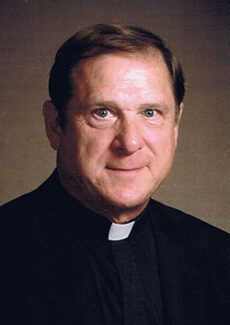The church as a community of faith and living stones, with Jesus as cornerstone

Father R. Michael Schaab
By Father R. Michael Schaab
Fifth Sunday of Easter/May 10
Acts 6:1-7; Psalm 33:1-2,4-5,18-19; 1 Peter 2:4-9; John 14:1-12
In the 50 days between Easter and Pentecost the emphases of the Sunday Scripture readings gradually change. At first the focus is on the risen Lord who has conquered sin and death. But as the feast of the descent of the Holy Spirit upon the Apostles comes closer, the readings begin to address the question, “What does it mean to be Church?” The readings for this Fifth Sunday of Easter are perfect examples of this shift in emphasis.
The first reading from the Acts of the Apostles records the appointment of the seven disciples to minister in the early Church. The term ‘Church’ is not used in the text. Rather, there is reference to “the community of the disciples,” and that is exactly what is so important. While in the past, the work of God was seen as being accomplished directly by an individual, as it was by the Lord in the Old Testament and by Jesus of Nazareth in the Gospels, now that work is accomplished by the community of faith.
An indication of this change can be found in the Responsorial Psalm where the Lord is recognized as the one who cared for Israel and preserved “them in spite of famine.” In the Acts of the Apostles, the responsibility for feeding the hungry is transferred to the community, which is responsible for making sure that no one is “neglected in the daily distribution” of food.
A SPIRITUAL HOUSE
While this shift from the work of God being accomplished by one person, our Savior Jesus Christ, to the work of God being accomplished by a community, the Church, is the point of the first reading, the second reading from the First Letter of Peter makes it clear that God’s people have always been called to community. Peter reminds us of the Old Testament titles this community was given, “a chosen race, a royal priesthood, a holy nation, a people of his own.” He adds another image of being “built into a spiritual house,” and points out that the difference between this and any of the older communities is that Jesus Christ, “the stone that the builders rejected has become the cornerstone” of this spiritual house. In other words, the risen Savior is always present in and part of the Church.
It may seem strange to say that Jesus Christ is “part of” the Church. What does that mean? It means that when Pentecost originally occurred, Christ was seated at the right hand of the Father in Glory because of Jesus’ Ascension into heaven. The human beings who made up the Church then, and who continue to form the Church to this very day, are not “in glory” for the Church still awaits its own resurrection. In other words, the Church is being built into a spiritual house with a glorified cornerstone, Jesus Christ, and lots of living stones who are still dealing with all aspects of their human nature — some glorious and some not so glorious.
That’s the beauty of the story of the Call of the Seven. The Church in its humanness had a very practical problem, feeding all the disciples, and it dealt with that problem in a very human way: it complained. But here is where the story differs from so many others stories of human needs being ignored, excused or covered up, or worse, becoming overwhelming.
PROCESS OF DISCERNMENT
The Church called upon the Holy Spirit of its cornerstone, the Risen and Glorified Christ, and that Holy Spirit solved the problem being experienced by all the “living stones” that make up the Church. By the way, the process of the Church, both Cornerstone and living stones, solving a very practical problem — complaining, discussing, deciding, and praying together — is called “discernment,” and it is still in use today. So, it’s critical that no complaint within the Church should ever be ignored, for that complaint might just be the way the Spirit is initiating a process of discernment.
The Gospel from John brings the scriptural reflection for this Sunday full circle. Christ prepares a dwelling for us in his Father’s house “so that where I am you also may be.” He also tells us he is “the way and the truth and the life.” So Jesus Christ is our heavenly goal and also our earthly way of attaining that goal. Furthermore, at the same time that he sits at the right hand of the Father in heaven, Christ also is in the Father and the Father is in him. Which means that at the same time we encounter Christ in the mystery of the Church we are also discovering our Father who art in heaven.
This is one of the most profound spiritual truths of our faith and it may well be why the Church, on the first Sunday after celebrating Pentecost, gives us the Feast of the Most Holy Trinity.
—
FATHER R. MICHAEL SCHAAB is a senior priest of the Diocese of Peoria who gives retreats and days of recollection, and who fills in as presider at parish Masses on weekends. He resides on a hobby farm in Putnam County.





